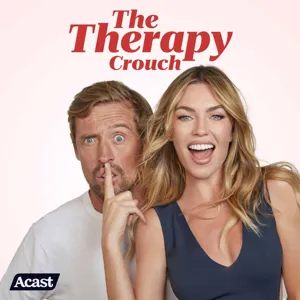Podcast Summary
No ads on The Peter Attia Drive podcast: The Peter Attia Drive podcast relies on listener support and offers exclusive benefits to members, keeping the relationship between host and audience simple and honest.
The Peter Attia Drive, a podcast dedicated to optimizing performance, health, and longevity, does not run ads and instead relies on listener support. Attia, the host, explained that he values trust and authenticity, and selling ads would compromise that. Instead, he has adopted a subscriber support model where members receive exclusive benefits, such as full access to exclusive show notes, downloadable transcripts, Ask Me Anything episodes, and special deals on products Attia loves. Attia's goal is to ensure that supporters receive more value than they give. This model keeps the relationship between Attia and his audience simple and honest.
AMA session with sleep expert Matthew Walker: Learn strategies to optimize sleep quantity and quality, create the right sleep environment, and explore the use of supplements like melatonin and CBD from renowned sleep expert Matthew Walker in this exclusive AMA session.
The host of the podcast, Peter Attia, is offering exclusive content for supporters in an ad-free environment. He's collaborating with companies whose products he already uses and endorses, allowing members to benefit from savings and valuable content. During this episode, Attia interviews Matthew Walker, a renowned neuroscientist and sleep expert, in a special AMA (ask me anything) session. They discuss various aspects of sleep, including how to optimize sleep quantity and quality, the importance of creating the right sleep environment, and the use of supplements like melatonin and CBD. This episode is a must-listen for anyone interested in improving their sleep, as they delve deep into strategies for enhancing sleep and recovering from poor sleep nights. To access the full episode and other exclusive content, consider supporting the podcast by subscribing at peteratiamd.com/subscribe.
Improving a child's sleep environment: Creating a sleep-conducive environment, establishing a consistent bedtime routine, limiting screen time, using white noise machines, and blackout curtains can significantly improve a child's sleep quality.
As parents, if we can't provide our children with a better sleep environment by changing schools, there are still steps we can take to improve their sleep. Professor Matthew Walker, a renowned sleep expert, emphasized the importance of creating a sleep-conducive environment, establishing a consistent bedtime routine, and limiting screen time before bed. He also suggested the use of white noise machines and blackout curtains. Although moving to a better school with a better sleep strategy is ideal, these practical steps can make a significant difference in a child's sleep quality. Additionally, Professor Walker shared his experience of giving a TED talk and the importance of adding a sense of wonderment to public speaking to make it more compelling.
Sleep tracking devices have limitations: While sleep tracking devices can provide insights into sleep duration and stages, they should be used with caution due to their limitations in accurately measuring light non-REM, deep non-REM, and REM sleep, and inconsistencies in measurements between individuals.
While sleep tracking devices like Fitbit, Aura, and Apple Watch can provide valuable information about sleep duration and stages, they are not perfect and should be used with some caution. Dr. Breus explained that these devices use a two-class or three-class algorithm to differentiate between wake and sleep states, and sometimes deep and REM sleep. However, they struggle with a four-class model that distinguishes between light non-REM, deep non-REM, and REM sleep. Moreover, the accuracy of these devices can vary significantly from one individual to another due to differences in physiology. However, within an individual, the devices' inconsistencies can provide valuable insights when compared to their established baseline. For instance, if an individual's deep sleep duration suddenly drops significantly, it's more likely that this is a real change rather than an error in the device's measurement. Therefore, while these devices can be useful tools for tracking sleep patterns and identifying trends, they should not be relied upon as the sole source of information for optimizing sleep. Instead, individuals should consider using a combination of self-reporting, sleep tracking devices, and professional evaluations to gain a more comprehensive understanding of their sleep quality and patterns.
Focus on weekly sleep trends, not daily fluctuations: Understand your sleep patterns, consider factors affecting sleep, and maintain a consistent eating schedule to improve sleep quality
When using sleep trackers, it's essential to focus on weekly trends rather than daily headlines. Once you have a baseline understanding of your sleep patterns, judge changes against that instead of worrying about day-to-day fluctuations. Additionally, be mindful of factors that can impact your sleep, such as eating habits. Eating large meals or consuming simple carbs close to bedtime can raise your core body temperature, making it harder to fall asleep. Aim to eat your last meal around three hours before bedtime to avoid digestive issues and help your body drop its core temperature for optimal sleep.
Food and exercise affect sleep quality: Avoid consuming simple sugars before bed and stop eating three hours prior for better sleep quality. Exercise negatively impacts sleep if done too close to bedtime, but the benefits of sleep on exercise outweigh the drawbacks.
Both food and exercise can impact the quality of your sleep. When it comes to food, it's recommended to avoid consuming simple sugars and to stop eating about three hours before bedtime. The reason being, food can increase core body temperature and disrupt the natural drop in temperature that helps prepare the body for sleep. Additionally, eating close to bedtime can lead to an increase in the hormone adenosine, which can make it harder to fall asleep. Regarding exercise, while it's known to have numerous benefits, it can also impact sleep negatively if done too close to bedtime. This is because exercise can increase core body temperature and trigger the release of hormones like adrenaline and cortisol, which can make it harder to fall asleep. The recommended cut off for exercising before bed is about two hours. However, it's important to note that the benefits of sleep on exercise are even more significant. Getting enough sleep can increase motivation to exercise, improve muscle strength, and reduce injury risk. Therefore, prioritizing good sleep hygiene can have a positive impact on both your sleep and your overall health and fitness.
Sleep deprivation affects motivation and appetite: Sleep deprivation releases hunger hormones and decreases motivation, leading to weight gain and obesity
Sleep deprivation can negatively impact both motivation and appetite, leading to a vicious cycle of decreased exercise and increased food consumption. The brain, under the false belief of being in a state of starvation due to lack of sleep, releases hormones like ghrelin and cortisol, which increase hunger and decrease feelings of fullness. At the same time, sleep deprivation can decrease motivation, making it harder to stick to exercise routines. This combination can contribute to weight gain and obesity. Additionally, the lack of sleep can impact cognitive function and overall well-being, making it essential to prioritize good sleep hygiene and adequate rest.
Sleep deprivation and high cortisol levels create a vicious cycle: Establish a wind-down routine to improve sleep quality by managing stressors and avoiding electronics with blue light
Sleep deprivation and hypercortisolemia are interconnected. Chronic sleep deprivation can lead to an increase in cortisol production, making it difficult to achieve optimal sleep. This creates a vicious cycle where the less you sleep, the higher your cortisol levels, and the more difficult it becomes to get good sleep. This issue may be evolutionary, as our bodies may produce more cortisol in response to stressors, including societal pressures. To improve sleep quality, it's essential to establish a wind-down routine before bed. This may include avoiding electronics with blue light, which can prevent the pineal gland from producing melatonin, and managing the emotional stressors that may contribute to sleep disturbances. By addressing these factors, individuals can create a more conducive environment for restful sleep.
Insights from Dr. Peter Attia on Longevity, Science, Performance, and Sleep: Subscribe to Dr. Attia's platform for access to exclusive content, discounts, and benefits related to longevity, science, performance, and sleep. Always consult healthcare professionals for medical advice.
Dr. Peter Attia offers valuable insights on various topics related to longevity, science, performance, and sleep through his podcast, blog, and social media channels. However, to access the full AMA sessions, extensive show notes, member-only discounts, and other benefits, one must become a subscriber. It's important to note that this content is for general informational purposes only and should not be considered a substitute for professional medical advice. Users should consult their healthcare professionals for any medical conditions they have. Dr. Attia also discloses his conflicts of interest and investments transparently on his website. To stay updated on his latest findings and insights, consider signing up for his weekly email newsletter. You can find him on Twitter for easy communication.






